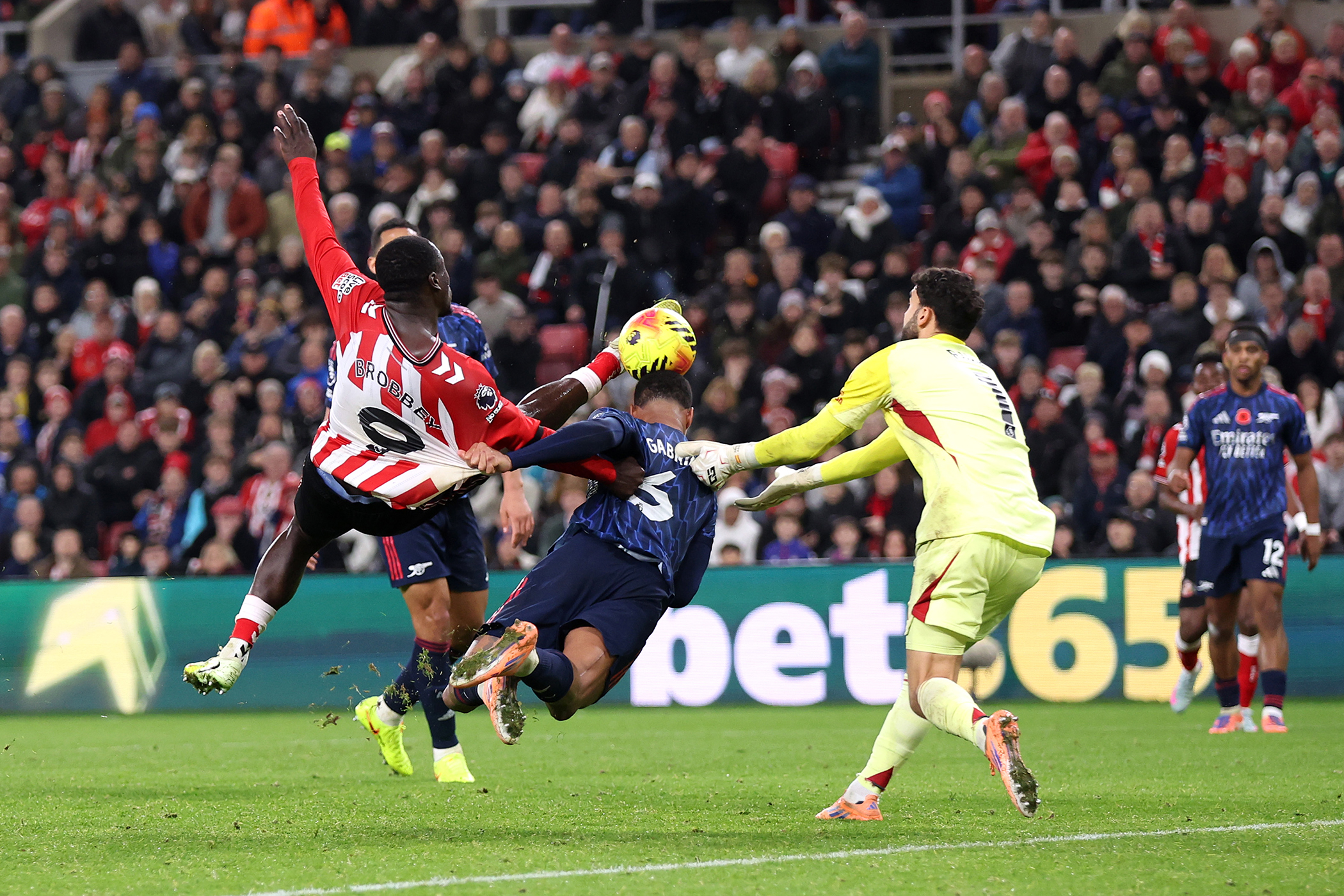For half an hour, maybe more, there was hope. It was at its most concentrated in Sunderland, of course, where the Stadium of Light bounced and roared and allowed itself to dream of a famous victory, but it pulsated out far beyond: to the blue side of Manchester and the red side of Liverpool and, for reasons of tribal enmity, along the Seven Sisters Road, too. Perhaps Arsenal were not immune to the chaos after all.
That is how it has felt, of course, for long stretches of this season. The Premier League has, in the nicest possible sense, been something of a mess for the last three months. The difference between the Champions League places and the depths of mid-table has been, by and large, a single win. Everyone has been in crisis. Bournemouth have been incredible. They are fifth. Tottenham were booed off last week. They are fourth. Everyone can beat everyone else. It is all noise. There is no signal.
Except for Arsenal. For the last six weeks or so, Mikel Arteta’s side have sailed above the tumult unfurling beneath them. They had won 10 games in a row across all competitions. They seemed so unflustered, so untouchable that they had not so much as conceded a goal for eight.
The last time David Raya was beaten, it was still September. Lily Allen’s divorce was a largely private matter. Mary Earps was broadly popular. They had started the day six points clear of their nearest (likely) contender, Manchester City, and seven ahead of the etiolated champions, Liverpool. Those two, fact fans, meet at the Etihad Stadium today. As Arsenal arrived in Sunderland, it felt like the sort of weekend when the gap might start to yawn into a chasm.
And then, a little after 6pm local time – after half an hour in which literally nothing of note had happened – Sunderland’s Robin Roefs heaved a garryowen forward. Arsenal’s backline, so indomitable for so long, did not instantly repel it. The ball bounced towards Nordi Mukiele, who turned it back inside, into the path of the onrushing Dan Ballard. His shot crashed past Raya. Arsenal, who have made such a virtue of their pragmatism, had been hoist by their own Ballard.
It has been the case for some time that Arsenal’s challenge this season is not so much tactical or technical or even physical; it is psychological. Arteta’s team have finished second for the last three years. They had, on some level, been operating under the assumption that should City falter, should the empire that Pep Guardiola has built start to crumble, they would be the ones to benefit. It did not quite work out like that last year.
This time around, there is little debate that Arteta has the deepest squad, the finest-tuned resources, the most complete team. The dominance they have established in between the October and November international breaks has been testament to that. While City and Liverpool, in particular, have been fumbling for form, Arsenal have barely blinked. This may be the most competitive iteration of the Premier League in its 33-year history. Arteta and his players do not appear to have been informed.
As the noise built around the Stadium of Light, though, it felt like a genuine test. Sunderland feels like a hopeful place at the moment. It is not just that the team are back in the Premier League and doing so well that a victory here would have put them second, at least for an evening, after more than a quarter of the season.
It is that the club chair, Kyril-Louis Dreyfus, invested so heavily in the summer, an indication that they was not happy just to be taking part, but intended to make their presence felt in the top flight for the first time in what feels like a long time. Granit Xhaka provided the stardust, of course, but Noah Sadiki, Chemsdine Talbi and the injured Habib Diarra all hint that Sunderland are thinking beyond keeping their heads above water. There is aspiration here.
And, more important still, it is that the club’s ambition reflects the city’s. The new footbridge that connects the Stadium of Light with the centre of town serves as the vanguard of a major redevelopment along the banks of the Wear. It has instantly become the favoured approach for thousands of fans, a source of not inconsiderable civic pride. All of that – the belief, the hope, the noise – stared Arsenal down.
Newsletters
Choose the newsletters you want to receive
View more
For information about how The Observer protects your data, read our Privacy Policy
Their response was emphatic. This Arsenal, this unyielding and unrelenting machine that Arteta has built, do not recognise anything so childish as hope. Sunderland made one mistake, just after half-time, Enzo Le Fée coughing the ball up in midfield to Declan Rice, and all of a sudden Bukayo Saka was drawing the league leaders level. Half an hour later, Leandro Trossard had put them ahead.
At that point, it seemed that the vulnerability had been a momentary glitch, not a feature. Along with all of their other qualities, Arsenal had that great intangible – grit – that so often defines winning teams, and they had it in abundance. That is what champions do: they find any flicker of insurgent hope, and they extinguish it.
The path seemed set. Arsenal would go into the international break with a lead of up to eight points, their challengers starting to recede in the distance. They would leave the rest of the league to punch each other out. The chaos, though, does not let go quite that easily. Four minutes into injury time, Bryan Brobbey hurled himself at a hopeful cross, his toe tapping the ball past Raya as Gabriel Magalhães stooped to clear it. For Sunderland, it felt a triumph. For the rest of the league, it is just a glimmer. But that will do, for now.
Photograph by George Wood/Getty Images



